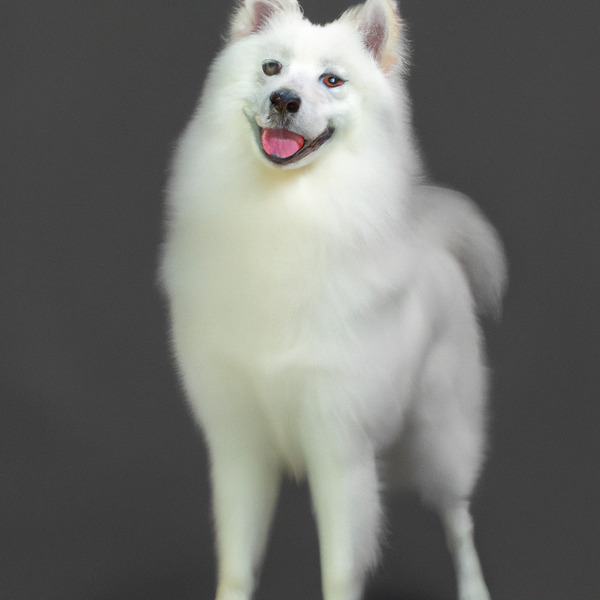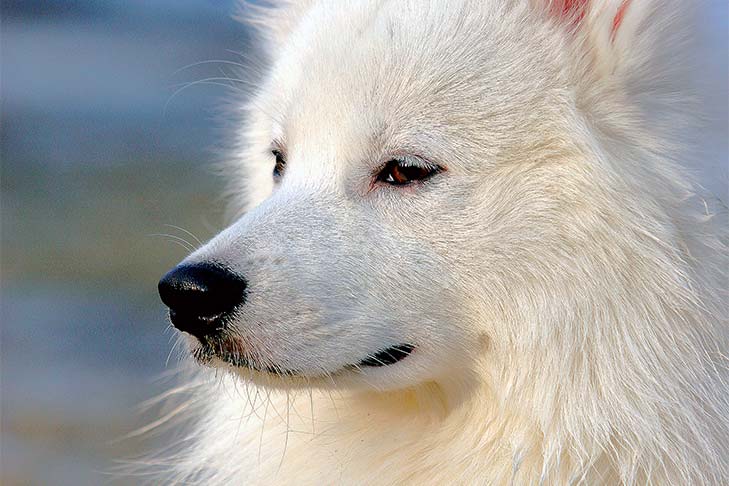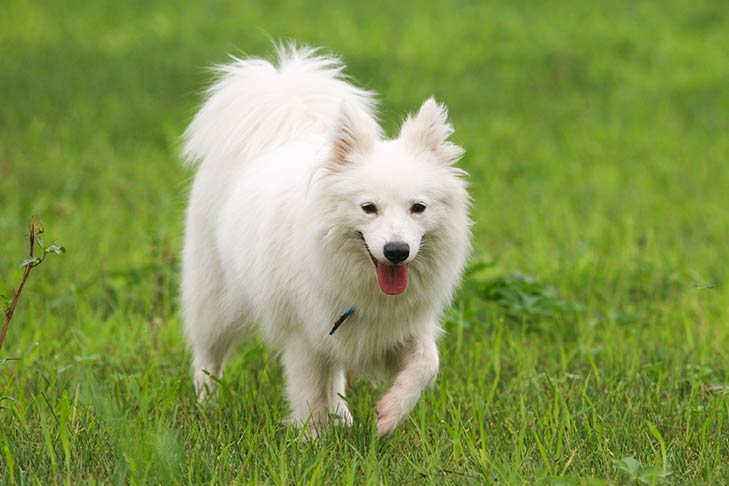Japanese Spitz
also known as Nihon Supittsu

 History
History
The Japanese Spitz is a relatively new breed, having been developed in Japan in the 20th century. It is believed that the breed was created by crossbreeding various other Spitz-type breeds, including the German Spitz, the American Eskimo Dog, and the Samoyed.
The exact origins of the Japanese Spitz are somewhat unclear, as there are several different stories about how the breed came to be. Some sources claim that the breed was developed by breeding smaller specimens of the German Spitz with each other, in an effort to create a smaller version of the breed. Other sources claim that the breed was created by crossing the German Spitz with the American Eskimo Dog, in order to create a breed that was better suited to the colder climate of Japan.
Regardless of its exact origins, the Japanese Spitz is a distinct breed that is recognized by several major kennel clubs around the world. The breed was officially recognized by the Japan Kennel Club in 1956, and has since become popular in Japan and other countries around the world.
Despite its popularity in Japan, the Japanese Spitz is still a relatively rare breed outside of Asia. It is recognized by several major kennel clubs, including the American Kennel Club, the Canadian Kennel Club, and the United Kingdom's Kennel Club, but it is not as well-known as some other Spitz breeds, such as the Pomeranian or the Siberian Husky.
Breed Information
Is Japanese Spitz a purebred?
Purebred
How do you pronounce the Japanese Spitz name? How do you say Japanese Spitzs?
jap-uh-neez spits
What were Japanese Spitzs originally used for?
Companion
How Long Do Japanese Spitzs Live? What is average life expectancy for a Japanese Spitz? How long can Japanese Spitzs live?
10-16 years
The average Japanese Spitz lifespan is somewhere between 10-16 years, provided they aren't beset by any exceptional health issues or injuries.
Japanese Spitz Height & Weight
How big is a full grown Japanese Spitz?

| Height | ||||
|---|---|---|---|---|
| Average | 6 months | 12 months | 18 months | |
| Male | 14-15 inches (35.6 - 38.1 cm) | 13.5 inches (34.3 cm) | 14.5 inches (36.8 cm) | 14.5 inches (36.8 cm) |
| Female | 12-14 inches (30.5 - 35.6 cm) | 12.0 inches (30.5 cm) | 13.0 inches (33 cm) | 13.0 inches (33 cm) |
| Weight | ||||
|---|---|---|---|---|
| Average | 6 months | 12 months | 18 months | |
| Male | 18-19 pounds (8 - 9 kg) | 15.5 pounds (7 kg) | 18.5 pounds (8 kg) | 18.5 pounds (8 kg) |
| Female | 15-17 pounds (7 - 8 kg) | 14.0 pounds (6 kg) | 16.0 pounds (7 kg) | 16.0 pounds (7 kg) |
Do Japanese Spitzs get fat easily?
![]()
![]()
![]()
![]()
![]()
The Japanese Spitz is a dog breed that has a low to average risk for obesity. This means that they are less likely to gain weight than some breeds, but it is still important to monitor their food intake and ensure they get enough exercise to maintain a healthy weight and overall well-being.
Are Japanese Spitzs Hypoallergenic?
No
Unfortunately, the Japanese Spitz is not hypoallergenic, making it not a good choice for a dog lover who suffers from pet allergies.
What is a Japanese Spitz personality? What are Japanese Spitz dogs best known for?
Affectionate
Proud
Intelligent
Companionable
Playful
Loyal
Are Japanese Spitzs heavy shedders? How Much Does a Japanese Spitz Shed?
![]()
![]()
![]()
![]()
![]()
Japanese Spitz dogs are not heavy shedders, but they will lose a significant amount of hair each year. To decrease the amount of shedding, you can regularly brush your Japanese Spitz. This will remove loose hair and keep his coat growing in the same direction.
What is the watchdog ability of a Japanese Spitz dog?
![]()
![]()
![]()
![]()
![]()
The Japanese Spitz dogs are average watchdogs. If they sense something different, this breed will alert their owner.
Breed History
Where do Japanese Spitzs come from?
Japan
What are Japanese Spitzs descended from?
Spitz-Type Dogs
What organizations or kennel clubs recognize/register the Japanese Spitz breed?
American Canine Registry
America's Pet Registry
Continental Kennel Club
Dog Registry of America Inc.
Federation Cynologique Internationale
Kennel Club of Great Britain
National Kennel Club
American Canine Association, Inc.
When were Japanese Spitzs first bred? How old is the Japanese Spitz breed?
1948
What Breed Group is a Japanese Spitz?
Northern (UKC)

Japanese Spitz Appearance
What color are Japanese Spitz eyes?
Brown
What color can Japanese Spitz nose be naturally?
Black
What color can Japanese Spitz coat be naturally?
White
How long is a Japanese Spitzs coat?
![]()
![]()
![]()
![]()
![]()
The coat of a Japanese Spitz is longer than that of the typical dog.
How Dense Is The Japanese Spitz Coat?
![]()
![]()
![]()
![]()
![]()
What is the texture of the hair of a Japanese Spitz?
Straight
How many puppies can a Japanese Spitz have in a litter? How many puppies can a Japanese Spitz have in her first litter?
10-16 puppies per pregnancy
A Japanese Spitz can have a litter of 10-16 puppies on average. However, it's worth noting that the size of the litters can vary greatly. Factors that can influence litter size include the health of the mother, breeding history, and genetics.
![]()
![]()
![]()
![]()
![]()
The adaptability of Japanese Spitz dogs is a well-known trait, they are known for being able to adjust well to different living environments and lifestyle changes.

Japanese Spitz Health Issues
Do Japanese Spitzs have a lot of health problems?
![]()
![]()
![]()
![]()
![]()
The Japanese Spitz is generally considered to be healthy. However, like all breeds, they are susceptible to certain health issues and it is important to keep an eye out for them and address them with your veterinarian as needed.
What are the major health concerns to be aware of when owning a Japanese Spitz?
Patellar Luxation
What are the less significant issues to keep in mind when it comes to Japanese Spitzs?
Ear Infections
Contact Allergy
Epilepsy
Obesity
What are the occasional tests recommended for Japanese Spitz breed?
Ear Examination
Skin Evaluation
Knee X-Rays

Japanese Spitz Needs and Activities
Do Japanese Spitzs have a lot of energy?
![]()
![]()
![]()
![]()
![]()
For those who lead a balanced lifestyle, Japanese Spitzs may be a good choice as they have an average energy level.
Do Japanese Spitzs need socialization? How social are Japanese Spitzs?
![]()
![]()
![]()
![]()
![]()
Japanese Spitz have very high social needs. These needs include regular mental and physical stimulation, a job or purpose, and companionship. They thrive in environments where they have a lot of interaction with humans and other dogs.
How much exercise should Japanese Spitzs get?
![]()
![]()
![]()
![]()
![]()
The Japanese Spitz dog requires a moderate amount of physical activity to maintain a healthy lifestyle. These breeds are ideal for people who have a moderate amount of time to devote to their pet and enjoy regular physical activity themselves. They also make great family pets as they have the energy to keep up with children and the temperament to be great companions.
How much sleep should a Japanese Spitz have? Do Japanese Spitzs sleep a lot?
![]()
![]()
![]()
![]()
![]()
The Japanese Spitz breed is known for its moderate energy levels and normal sleep patterns, typically sleeping around 12-14 hours per day.
Does a Japanese Spitz drool a lot?
![]()
![]()
![]()
![]()
![]()
The Japanese Spitz is a breed of dog that is characterized by its minimal drooling, making it an ideal choice for people who dislike drool marks on their clothing.
How much does it bark?
![]()
![]()
![]()
![]()
![]()
Japanese Spitz dogs bark and howl frequently, they are not a good fit for quiet homes.
Do Japanese Spitzs exhibit aggressive behavior to safeguard their home and territory? Do they possess a natural tendency to guard?
![]()
![]()
![]()
![]()
![]()
These dogs are known for being extremely protective and make excellent guard dogs. They possess a strong instinct to defend their territory and owners and have a high level of vigilance and alertness.
Are Japanese Spitzs mouthy?
![]()
![]()
![]()
![]()
![]()
What is the likelihood of a Japanese Spitz running away? Do they have a tendency to explore or wander frequently?
![]()
![]()
![]()
![]()
![]()
Do Japanese Spitz dogs have a high prey drive?
![]()
![]()
![]()
![]()
![]()
What do Japanese Spitzs enjoy doing? How do I keep my Japanese Spitz busy?
Shopping (, Car rides
What is the energy level of a Japanese Spitz? How much energy does a Japanese Spitz have?
Medium
Japanese Spitzs are medium-energy dogs and typically enjoy socializing and playing casual or even sustained games of chase with other dogs. They may also have occasional periods of barking or racing around the house.
![]()
![]()
![]()
![]()
![]()
How far should a Japanese Spitz walk each week? How many miles should a Japanese Spitz walk every week?
7 miles / week
There's really no limit to how far you walk your dog as long as they're comfortable. For Japanese Spitz, it's at least 7 miles / week. Just remember to build distance and stamina gradually over time.
How much a Japanese Spitz should exercise a day? How much activity does a Japanese Spitz need?
45 minutes
In general most Japanese Spitzs usually need at least 45 minutes of exercise daily. This can be spread across the day and include all sorts of high-energy activities, like walking, running and playing.
What level of grooming should be provided for a Japanese Spitz?
![]()
![]()
![]()
![]()
![]()
The Japanese Spitz is a breed of dog that requires a significant amount of grooming. They will also require regular trims, and a professional groomer's help is often necessary to keep their coat in good condition. They may also need regular baths to maintain their coat and skin.
How often should you brush a Japanese Spitz?
Daily
Ideally, Japanese Spitz should be brushed at least 2 or 3 times a week (preferably daily) improve shedding.
What are the most commonly used brushing tools for Japanese Spitzs?
Pin Brush
Comb
Scissors
Nail Clipper
Costs
How many cups of food does a Japanese Spitz eat?
1 cups
For an average 18-19 pound (8 - 9 kg) Japanese Spitz feed 1 cups daily. But, keep in mind, the amount you feed is going to be dependent on the quality of the food you are feeding.
How Much Does a Japanese Spitz Cost Daily?
$1.30 - $1.40 / day
The average cost of a Japanese Spitz is somewhere $1.30 - $1.40 per day.
How Much Does a Japanese Spitz Cost Per Month?
$35 - $42 / month
The average per month expenses of a Japanese Spitz is between $35 - $42. This makes an average of $420 - $504 per year. It will be on the higher side when the dog is still small because it will need more frequent visits to the vet, shots.
Japanese Spitz Characteristic
How intelligent is a Japanese Spitz?
![]()
![]()
![]()
![]()
![]()
Japanese Spitzs has average obedience intelligence. But, they're also independent thinkers. The Japanese Spitz is a breed with an exceptionally high IQ and may get into mischief if left to their own devices.
How sensitive is a Japanese Spitz dog?
![]()
![]()
![]()
![]()
![]()
Japanese Spitz dogs have average emotions and are adaptable to different situations, not requiring extra care like sensitive breeds do.
Are Japanese Spitz dogs affectionate?
![]()
![]()
![]()
![]()
![]()
Do Japanese Spitz do well in apartments? Are Japanese Spitzs good indoor dogs?
![]()
![]()
![]()
![]()
![]()
Japanese Spitzs are known for being excellent apartment dogs. They are fairly active indoors and will do okay without a yard.
Are Japanese Spitzs good with kids? Are Japanese Spitzs good around children?
![]()
![]()
![]()
![]()
![]()
A Japanese Spitzs typical characteristics indicate that this breed of dog is an ideal companion for kids and makes them family pets. Their gentle and protective nature and calm mentality make them gel along quickly with the younger humans
Are Japanese Spitzs good for elderly?
![]()
![]()
![]()
![]()
![]()
Are Japanese Spitzs good with cats? How friendly Japanese Spitzs are toward cats?
![]()
![]()
![]()
![]()
![]()
Japanese Spitzs are one of the best dogs for cats. They're accept cats readily as part of the family. However, this dog breed should be trained to not chase after the kitty early on
Do Japanese Spitz dogs get along with other dogs? Are Japanese Spitzs OK with other dogs?
![]()
![]()
![]()
![]()
![]()
Japanese Spitzs are friendly, active and loyal companions. They generally love to be around other dogs, making them a good family pet for some,
How do Japanese Spitz dogs interact with other pets? Are they considered pet-friendly?
![]()
![]()
![]()
![]()
![]()
Are Japanese Spitzs friendly with strangers?
![]()
![]()
![]()
![]()
![]()
Japanese Spitzs are average friendly around strangers. They can be wary around strangers and a little standoffish. Early socialisation is key.
Do Japanese Spitzs like to play? Are Japanese Spitzs playful?
![]()
![]()
![]()
![]()
![]()
Japanese Spitzs are known to be highly playful dog. So if you're not up for all that, think about adopting a slightly older Japanese Spitz for a mellower experience.
Are Japanese Spitz easily trained?
![]()
![]()
![]()
![]()
![]()
Japanese Spitz dogs are usually easy to train, but may require consistency to fully obey commands.
 Pros & Cons
Pros & Cons
Pros
- Cat Friendly
Having a Japanese Spitz in the household can be compatible with having a cat as well. - Maintain a healthy weight
The risk of overweight in Japanese Spitzs is generally low to average. - Small size
Japanese Spitz are small to medium-sized dogs that can be a good fit for apartment living or other small living spaces. - Low shedding
Japanese Spitz have a non-shedding coat, which can make them a good choice for people with allergies. - Intelligent and trainable
Japanese Spitz are intelligent and have the ability to learn quickly, which makes them relatively easy to train.
Cons
- Barking
The breed of this dog is known for its loudness. - Health issues
As with any breed, Japanese Spitz may be prone to certain health issues. These can include hip dysplasia, dental problems, and other issues. - Separation anxiety
Japanese Spitz can be prone to separation anxiety, which can lead to destructive behavior when left alone for long periods of time. - Not suitable for office environment
An office is not the best place for a Japanese Spitz. - Not Hypoallergenic
The non-hypoallergenic nature of Japanese Spitzs can lead to allergic reactions in people prone to allergies. - Exercise needs
Japanese Spitz have moderate exercise needs and may require daily walks or other forms of physical activity to stay healthy and happy.
Compare Japanese Spitz with other dogs
- Japanese Spitz vs Engatzu Spaniel
- Japanese Spitz vs Irish Wolfhound
- Japanese Spitz vs Wee-Chon
- Japanese Spitz vs Cane Corso
- Japanese Spitz vs Jack-Rat Terrier
- Japanese Spitz vs American Bull-Jack
- Japanese Spitz vs Taylor's Bulldane
- Japanese Spitz vs Mountain Bulldog
- Japanese Spitz vs Pekarin
- Japanese Spitz vs Cairnese